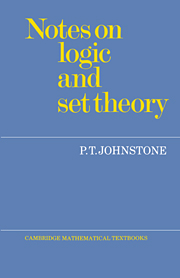7 - The axiom of choice
Published online by Cambridge University Press: 05 June 2012
Summary
We saw in the last chapter that ordinals (or equivalently wellorderings) are useful things to have around. Moreover, any model of set theory contains ‘arbitrarily large’ ordinals: not only is the class ON not a set (if it were, it would be a member of itself by Lemma 6.2 and Corollary 6.4(b), contradicting the well-foundedness of ordinals – this is known as the Burali–Forti paradox), but we have
Lemma 7.1 (Hartogs' Lemma). For any set a, there exists an ordinal α which cannot be mapped injectively into a.
Proof. α can be mapped injectively into a iff α is the order-type of some well-ordering of a subset of a. We can form the set S ⊆ P(a × a) of all well-orderings of subsets of a using the Power-set and Separation axioms, and Mostowski's Theorem in fact produces a function-class which sends every well-ordering to its order-type; so by Replacement the ordinals which can be mapped injectively into a form a set γ(a), say. γ(a) is clearly an initial segment of ON, and hence is itself an ordinal; and it cannot be mapped injectively into a. □
Nevertheless, for many purposes we would like something better than this: namely a bijection between a and an ordinal, or equivalently a well-ordering of the whole of a. The need for such became apparent in the last years of the nineteenth century, when G. Cantor began to prove results in point-set topology by transfinite induction methods.
- Type
- Chapter
- Information
- Notes on Logic and Set Theory , pp. 78 - 87Publisher: Cambridge University PressPrint publication year: 1987



